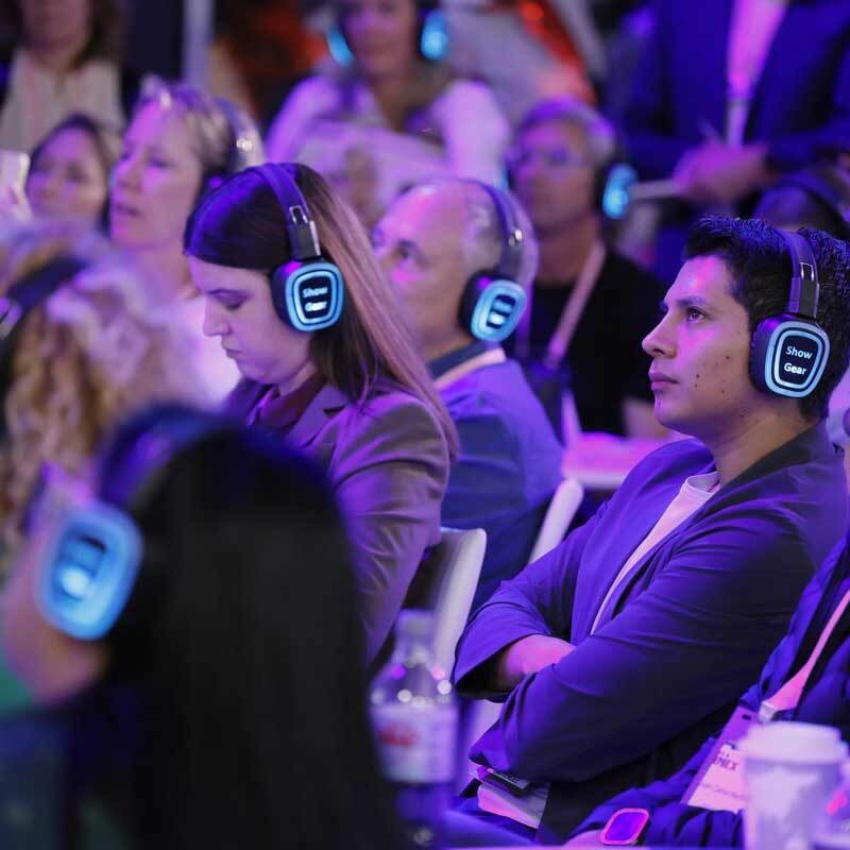Whether you’re organizing conferences, trade shows or experiential activations, understanding event marketing and how to build brand awareness is essential. In this article, we explore event marketing fundamentals, sharing practical strategies and tips to help you make a bigger impact.
What is event marketing?
Event marketing is the process of promoting, planning and delivering events to achieve specific business goals. These goals often include building brand awareness, generating leads, fostering relationships and creating memorable experiences. Effective event marketing goes beyond logistics—it’s about building meaningful connections between your brand and your audience.
For event professionals, event marketing covers everything from pre-event promotion and registration to on-site engagement and post-event follow-up. It’s a holistic approach that uses multiple channels. Social media, email, content and experiential marketing are key to reaching your audience.
Why event marketing matters
Events are powerful tools for brands and organizations. They offer unique opportunities to showcase products, share knowledge and connect with customers and partners in person.
Through events, you can:
Build brand awareness: Events put your brand in the spotlight and allow you to communicate your values, vision and products direct to your audience
Generate leads: A well-executed event attracts qualified prospects and creates opportunities for meaningful conversations that can lead to new business
Invite your audience to experience your brand: Events open the door to immersive experiences that leave a lasting impression—helping your brand and products stand out
Build relationships: Meeting face to face builds trust and loyalty. It strengthens ties with clients, partners and industry peers.
How you can create an effective event marketing strategy
A successful event marketing strategy begins with clear goals,
Here are six essential steps to build a strategy that delivers results:
1. Define your goals
Decide what you want to achieve. Are you aiming to build brand awareness, generate leads, launch a new product or educate your audience? Clear goals guide your decisions and help you measure success.
2. Know your audience
Understanding your audience is crucial. Consider their needs, preferences and pain points. Use data from previous events, surveys and social media insights to create detailed profiles that shape your approach.
3. Develop your messaging
Create a strong message that connects with your audience and reflects your brand values. Keep your message clear and concise. Adapt it to each stage of your campaign, from the first invitation to post-event follow-ups .
4. Choose the right channels
Meet your audience where they are. Use a mix of channels to reach them.
Social media builds excitement and engagement before, during and after the event. Email campaigns, content marketing and influencer partnerships can amplify your reach.
Research where your audience spends time online. Are they active on LinkedIn or more responsive to email? Choosing the right channels can be a game changer.
5. Create engaging experiences
Experiential marketing is at the heart of successful events. Design interactive activities, immersive environments and networking opportunities that make your event memorable.
Consider incorporating technology such as event apps, live polls and virtual reality to enhance engagement. Promote these features in your pre-event marketing. 6. Measure and optimize
Track metrics such as registration numbers, attendee engagement, social media activity and lead generation. Use these insights to refine your strategy and improve future events.
Insights from IMEX America 2025: Human-centric and disruptive event marketing
At IMEX America 2025, industry experts shared insights on the evolving skill of event marketing.
Here are five standout takeaways that you can apply:
- Human-centricity leads the way: Speakers Jay Schwedelson, Founder of GURU Media Hub, and Olivia Breene, CEO and Founder of Lateralus B Creative Consulting, emphasized that authentic human connection is now the most powerful differentiator. Moving beyond automation, they encouraged marketers to design experiences that make attendees feel genuinely seen and valued.
- Event professionals as strategic partners: Joelle Morgan, VP of Brand at AssetMark, and Stephanie Grey, Partner and SVP Sales & Strategy at Unbridled Solutions, highlighted the need for event professionals to step into strategic roles, focusing on business growth and confidently discussing data, ROI and revenue impact with leadership teams.
- Agile teams and continuous learning: Tracy Judge, Founder and CEO of Soundings, and Nikki Gonzales, Chief of Staff at Soundings, presented research showing that adaptability and upskilling are essential as AI transforms the industry. They painted a stark picture: by 2030, 40% of current job skills will be obsolete, and AI will have transformed 86% of businesses. Adaptability and continuous learning are the now most critical human skills. Building flexible teams that blend full-time staff with specialized freelancers can help organizations stay nimble.
- Disruptive, data-informed tactics: Jay Schwedelson advocated for unconventional approaches—such as lo-fi, unpolished content and creative email strategies—to cut through digital noise and capture attention. Marketers should test constantly and measure success by their own benchmarks.
- Measuring emotional impact: Experience strategist at Reuleaux, Laura Hess’ return on experience (ROX) framework measures emotional impact and sentiment. She encourages event marketers to start measuring how events make attendees feel, not just traditional metrics like lead counts. This approach helps demonstrate deeper value through brand loyalty and advocacy.
By embracing these principles, business event professionals can create more engaging, memorable and impactful events.
Leveraging social media for event marketing
Social media is essential for event marketing. It helps you reach a wide audience, build anticipation and nurture real-time engagement.
Here’s how to make the most of social media in your strategy:
Share behind-the-scenes content: Give your audience a glimpse of the planning process, speaker interviews and sneak peeks to build excitement
Engage with attendees: Respond to comments, share user-generated content and spark conversations to create community
Use paid advertising: Targeted ads help you reach specific and new segments and drive registrations
Experiential marketing: Creating memorable moments
Experiential marketing turns events into unforgettable experiences. By engaging senses and emotions, you create deeper connections and lasting memories.
Try these four experiential marketing tactics:
Interactive installations: Design branded booths, unique product demos or immersive environments that invite participation
Live entertainment: Music, performances or guest speakers energize your audience, boost their mood and make the experience more memorable
Personalization: Use pre-event data to tailor experiences, through, for example, personalized agendas or VIP access
Gamification: Games, challenges or competitions encourage engagement and reward participation
Lead generation through event marketing
Events provide a unique opportunity to connect with prospects and move them through the sales funnel.
Maximize lead generation with:
Pre-event outreach: Use targeted email campaigns and social ads to attract qualified attendees
On-site engagement: Collect contact details through registration, badge scans or interactive activities
Post-event follow-up: Send thank-you messages, share highlights, send surveys and nurture leads with relevant content
Building brand awareness with events
Events are a powerful platform for building brand awareness.
Focus on consistency, authenticity and creativity:
Consistent branding: Keep your logo, colors and messaging visible across all materials and touchpoints
Storytelling: Share your brand story through presentations, panels and marketing collateral
Media coverage: Invite journalists and influencers to cover your event and amplify reach through press releases and social media
Tips for effective event marketing
- Keep your messaging clear and concise
- Use short paragraphs for readability
- Foster a warm, friendly and inclusive tone
- Use data and feedback to improve continuously
Event marketing requires creativity, strategic thinking and a deep understanding of your audience.
By implementing an effective event marketing strategy—using social media, embracing experiential marketing and focusing on lead generation and brand awareness, you can create impactful events that deliver results.





